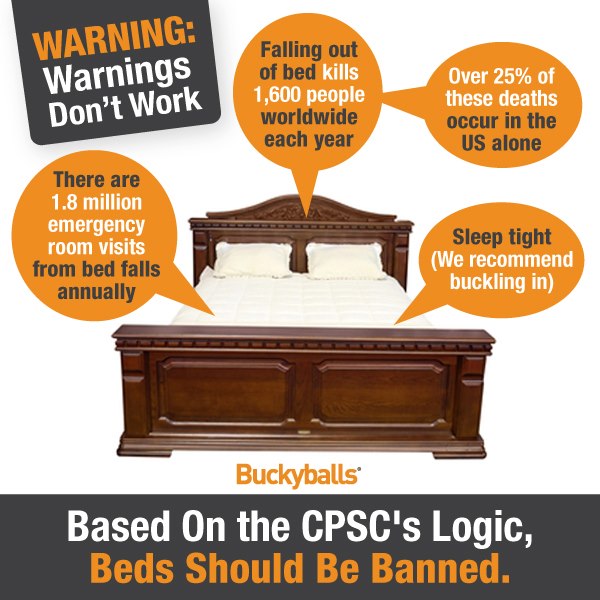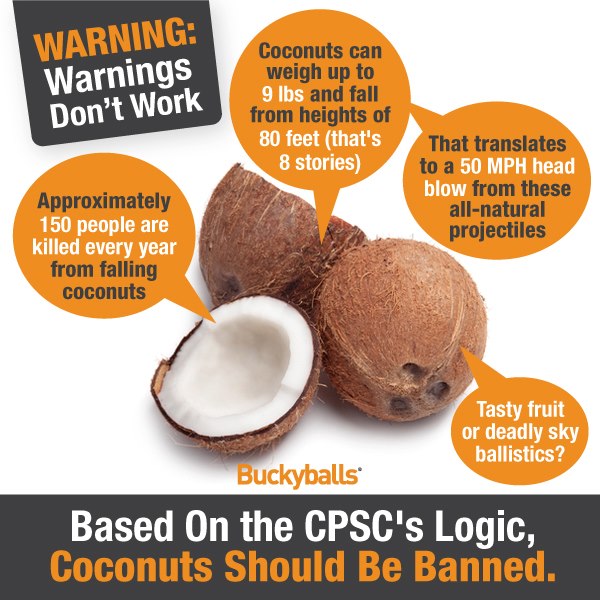Save Our Balls: Buckyballs Fights Back
Posted: Thu Oct 18, 2012 11:30 am
http://abnormaluse.com/2012/10/buckybal ... logic.html
[INDENT]TUESDAY, OCTOBER 16, 2012
Buckyballs Fights Back, Mocks CPSC Logic
Recently, we here at Abnormal Use reported on the Consumer Product Safety Commission’s efforts to ban the spherically shaped magnets known as Buckyballs. As you might recall, we were a little critical of the CPSC’s over-zealous tactics to protect the public from swallowing the magnets. Call us reckless, if you will, but we just didn’t see the necessity of banning a product whose alleged “hazards” could be cured by a little self-policing by the consumer. The product had warnings. Common sense could keep any accidents from happening. Sometimes, it appears that, according to the CPSC’s logic, any product could be unreasonably dangerous.
Apaprently, the Buckyballs company made the same observation.
Buckyballs has taken to Facebook launching its own campaign against the CPSC’s logic. As pictured above, Buckyballs’ creativity did not cease with the invention of the magnetic sphere. It’s true. Any product, including a bed, can pose a hazard when not used properly. As much as we love warning labels, even with them, accidents can sometimes occur. Obviously, it would be ridiculous to require these types of warnings for a bed.
While we agree that the CPSC’s draconian efforts to ban Buckyballs are ridiculous, the company’s campaign is comparing apples to oranges. In most instances, falling out of a bed is accidental and not the result of the sleeper’s own comparative fault. The ingestion of magnetic spheres, on the other hand, typically takes some ridiculous affirmative act. Even though a warning should not be necessary with either product, at least with Buckyballs, the label need only warn the user to exercise common sense.
In the case of Buckyballs’ coconut spoof, we must respectfully disagree. Coconuts should be banned, but not due to the risk of injury from their falling. Rather, coconuts should be banned – or at least heavily regulated by the FDA – as an unsafe food additive. How many times have you been handed a delicious looking piece of cake only to discover after biting into it that it has been tainted by this horrible food? A discovery that undoubtedly induces a negative reaction – one that can pose dangerous to those in the vicinity. Therfore, coconuts should be banned. Perfect CPSC logic.
[/INDENT]http://www.getbuckyballs.com/
[INDENT]TUESDAY, OCTOBER 16, 2012
Buckyballs Fights Back, Mocks CPSC Logic
Recently, we here at Abnormal Use reported on the Consumer Product Safety Commission’s efforts to ban the spherically shaped magnets known as Buckyballs. As you might recall, we were a little critical of the CPSC’s over-zealous tactics to protect the public from swallowing the magnets. Call us reckless, if you will, but we just didn’t see the necessity of banning a product whose alleged “hazards” could be cured by a little self-policing by the consumer. The product had warnings. Common sense could keep any accidents from happening. Sometimes, it appears that, according to the CPSC’s logic, any product could be unreasonably dangerous.
Apaprently, the Buckyballs company made the same observation.
Buckyballs has taken to Facebook launching its own campaign against the CPSC’s logic. As pictured above, Buckyballs’ creativity did not cease with the invention of the magnetic sphere. It’s true. Any product, including a bed, can pose a hazard when not used properly. As much as we love warning labels, even with them, accidents can sometimes occur. Obviously, it would be ridiculous to require these types of warnings for a bed.
While we agree that the CPSC’s draconian efforts to ban Buckyballs are ridiculous, the company’s campaign is comparing apples to oranges. In most instances, falling out of a bed is accidental and not the result of the sleeper’s own comparative fault. The ingestion of magnetic spheres, on the other hand, typically takes some ridiculous affirmative act. Even though a warning should not be necessary with either product, at least with Buckyballs, the label need only warn the user to exercise common sense.
In the case of Buckyballs’ coconut spoof, we must respectfully disagree. Coconuts should be banned, but not due to the risk of injury from their falling. Rather, coconuts should be banned – or at least heavily regulated by the FDA – as an unsafe food additive. How many times have you been handed a delicious looking piece of cake only to discover after biting into it that it has been tainted by this horrible food? A discovery that undoubtedly induces a negative reaction – one that can pose dangerous to those in the vicinity. Therfore, coconuts should be banned. Perfect CPSC logic.
[/INDENT]http://www.getbuckyballs.com/

